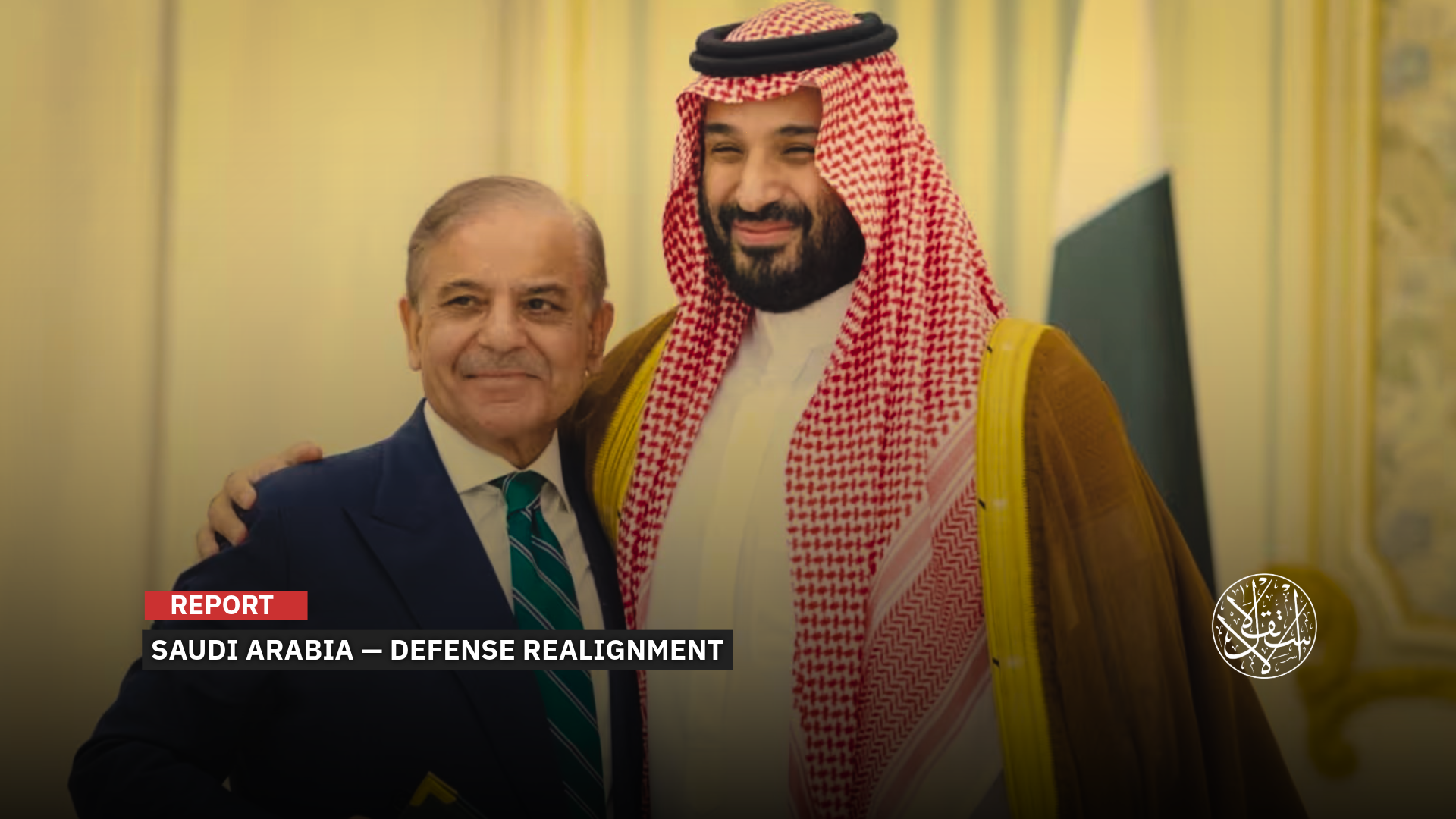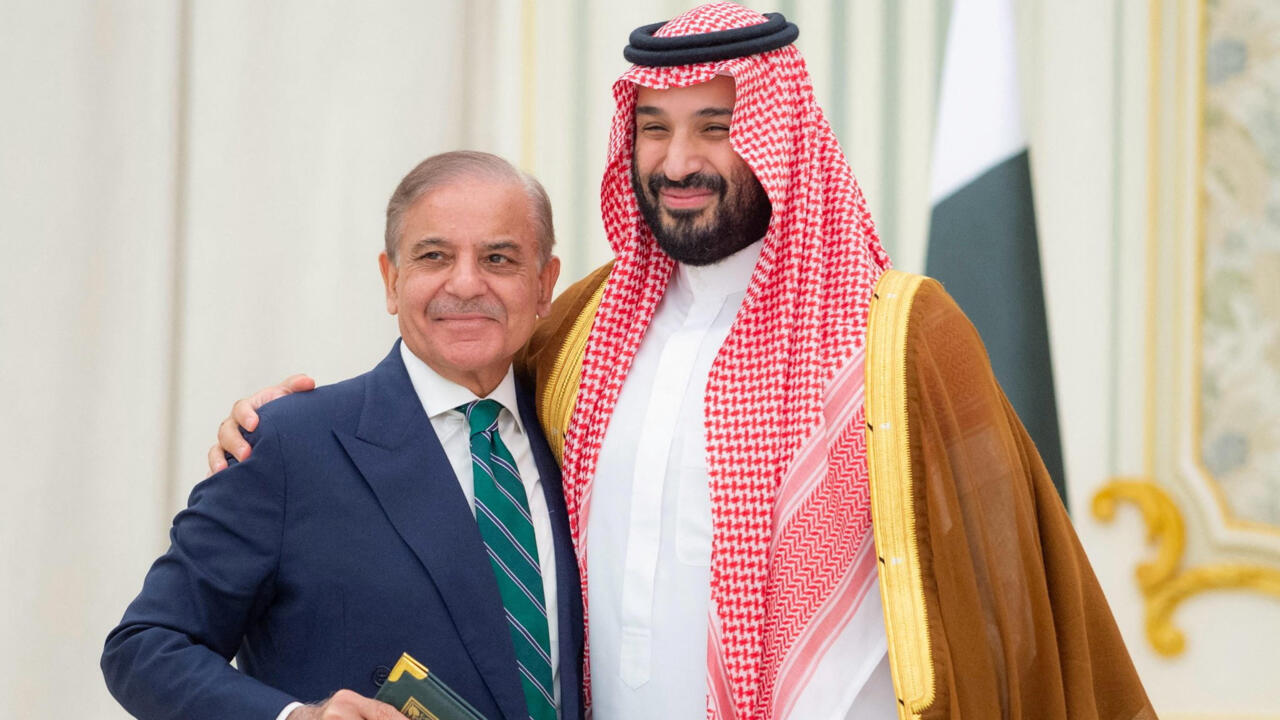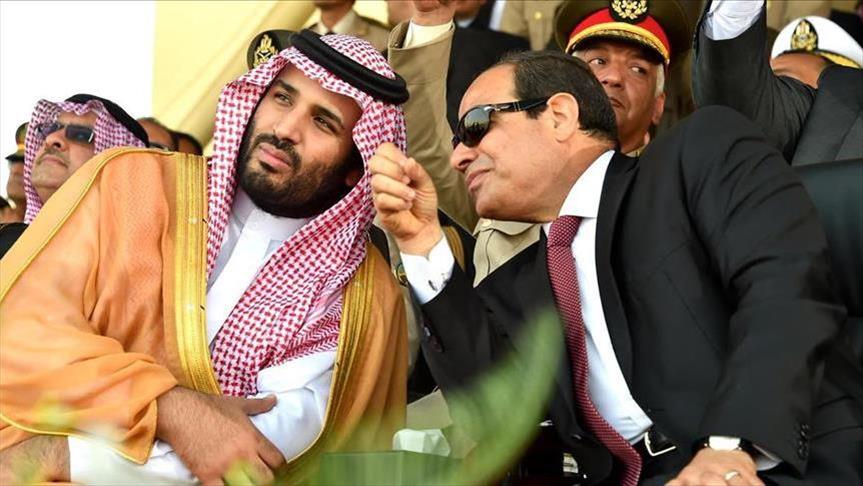Saudi Arabia Forges Defense Ties With Three Islamic States, But Sidelines Egypt

Egypt faces major challenges in mending ties with Saudi Arabia and reviewing its domestic affairs.
While Saudi Arabia moved to finalize a joint defense agreement with Pakistan, it simultaneously opened the door to defense cooperation with Iran and pursued the development of its military capabilities in collaboration with Turkiye. Notably, however, it did not approach its ally Egypt to reach any similar understanding.
These Saudi moves, coming in the wake of “Israel’s” strike on Qatar on September 9, 2025, have prompted speculation over whether they could lead to the creation of an integrated Islamic military force in the Middle East, capable of countering Israeli threats and expansionist ambitions.

Three Directions
As tensions escalated in the Middle East to the point of an Israeli airstrike on Qatar’s capital, Doha, Saudi Arabia opened the door to defense cooperation with three regional powers, independently of its previous military alliances with the United States.
Foremost among these was Pakistan, with which Saudi Arabia signed a joint defense agreement on September 17, 2025, following a session of talks in Riyadh between Crown Prince Mohammed bin Salman and Pakistani Prime Minister Shehbaz Sharif.
The agreement stipulates that “any attack on one country is an attack on both,” as part of the two nations’ efforts to bolster their security and promote peace in the region and beyond. It also aims to “develop aspects of defense cooperation between the two countries, and strengthen joint deterrence against any aggression.”
One day after the extraordinary Arab-Islamic summit in Doha on the targeting of Qatar, Iranian Supreme National Security Council Secretary Ali Larijani visited Riyadh on September 16 for a one-day trip, meeting with Crown Prince Mohammed bin Salman and Defense Minister Khalid bin Salman.
Larijani told the official IRNA news agency on September 17 that his discussions with Mohammed bin Salman focused on defense cooperation between the two countries, which will be carried out in structured groups and take a more organized form in the future.
Asked whether the aggression against Qatar had prompted a shift in Arab states’ strategies, he said, “Yes, of course, our friends in Saudi Arabia already had a relatively clear vision of these developments, but now it is much clearer.”
Referencing the threat posed by “Israel,” Larijani added, “The countries of the region have concluded that the presence of a reckless element in the area will prevent the establishment of stability, as Iran has previously stated.”
Following this, Saudi Assistant Defense Minister Khaled al-Biyari met with the head of Turkiye’s Defense Industries, Haluk Gorgun, and the Minister of Industry and Technology, Mehmet Fatih Kacir, to discuss cooperation in defense industries and localization of technology between Riyadh and Ankara, according to a Saudi statement on September 19.

Potential Enemy
Regarding Riyadh’s moves and their implications, retired Lebanese Brigadier General Hisham Jaber, head of the Middle East Studies Center, said that “the joint defense agreement has been under discussion in Saudi Arabia for some time, reflecting its desire to diversify sources of weapons and defense, and not to rely solely on one country, the United States.”
The military expert told Al-Estiklal that “Saudi Arabia became convinced after the strike on Qatar that the U.S. military bases in the Gulf are not there to protect Gulf states, but to safeguard American interests and cover Israeli aggression.”
“Arab armaments in general, especially in the Gulf states, may rely on the United States for up to 90 percent, yet the U.S., and they are aware of this, does not provide them with the most advanced, latest-generation weapons, but only the penultimate models.”
“The strike on Doha convinced Saudi Arabia of the need for a defense strategy that does not rely solely on the United States, though this does not mean abandoning American support in security and defense,” Jaber added.
According to Jaber, “Saudi rapprochement with Iran and Pakistan, especially since the latter two are allied states, was evident when the Iranian side came under Israeli attack on June 13, and Islamabad immediately offered its air defense to Tehran.”
“Saudi cooperation with Pakistan comes at the same time as Riyadh opens up to Tehran,” noting that “the Saudi-Pakistani alliance is extremely important because Pakistan is a nuclear state, and both sides recognized the necessity of this; it was expected long ago, not just now.”
On Saudi-Iranian cooperation, Jaber said, “It has not yet reached the stage of an alliance between Iran and Saudi Arabia, which remains a long-term prospect, but it is important for defense strategy, as there is always a need to identify the potential adversary.”
“The United States had made Gulf states understand that the potential enemy was Iran, but after this strategic leap, the Israeli strike on Qatar, it is necessary to reassess who the adversary is, because Iran is no longer the obvious and prominent potential enemy in light of this Israeli aggression.”
Jaber added, “The question now is whether the potential adversary for Gulf states could be Israel; that is possible, but it is far too early to discuss this prospect at present.”
“Following the Saudi-Pakistani agreement, Iran is no longer considered the potential adversary, as the alliance between the two had been expected and dependent on the sequence of events, and the same applies to Turkey.”
“In light of regional shifts, the Turkish-Israeli rift, and Israel’s threats to Turkiye, we can expect new alliances to emerge on the ground, as happened with the Saudi-Pakistani partnership, which took everyone by surprise,” Jaber said.

Military Integration
On the same issue, Egyptian opposition politician Ayman Nour commented on Saudi Arabia’s moves, saying that “the agreement signed on September 17 between Riyadh and Islamabad is an unprecedented qualitative development, clearly stipulating that any attack on one party is considered an attack on both.”
Nour told the Egyptian platform Rasd on September 19 that “the agreement covers all military defensive means, particularly as Pakistan possesses the sixth-largest army in the world and is a nuclear power, raising important questions, including whether the latter could be allowed to deploy some nuclear missiles to the region.”
“There is a significant strategic dimension that goes beyond the Gulf region in general: Saudi Arabia has begun to stake its own security and that of the Gulf on a broader regional calculation, especially given cooperation between China and Pakistan, which indirectly amounts to cooperation between China and Saudi Arabia, adding another layer to the agreement.”
“The timing of the agreement is highly significant, coming after the Israeli attacks on the Qatari capital Doha, and amid a growing sense in the Gulf, particularly in Saudi Arabia, of the absence of Western guarantees,” Nour added.
“The agreement presents several challenges regarding regional partners, specifically Turkiye, which can play an important role in supporting advanced weapons manufacturing, given its relative advantage in this field.”
The Egyptian opposition figure noted that “Turkiye can complement Pakistan’s role, which is primarily linked to rapid intervention capabilities in the event of an imminent threat.”
He concluded that the Saudi-Pakistani joint defense agreement constitutes an important addition to Arab national security, but that the concept should be reshaped through broader partnerships with all relevant parties.
On this point, political researcher Liqaa Maki commented in a post on X on September 19, saying, “Following the defense treaty with Pakistan, Saudi Arabia is moving to deepen cooperation with Turkey in the defense industries.”
“These are signals that merit careful attention, as they suggest it is possible to achieve a degree of defense autonomy without being part of competing international blocs. Most importantly, they may mark the beginning of an unprecedented Islamic military integration,” he noted.
Why Egypt?
Regarding why Saudi Arabia has not turned to Egypt, despite it being an ally, military expert Hisham Jaber said, “Relations between the two countries are good, but they have not reached the point of establishing a bilateral defense agreement.”
Jaber added that “this could be achieved in the future, but only once events develop and everyone agrees on whom the potential enemy is, which must be determined before any defense strategy is undertaken.”
On whether Riyadh’s hesitancy toward Cairo is linked to Egypt’s refusal to join Saudi Arabia in the Yemen conflict in 2015, Jaber noted, “There are certainly differences of opinion between the kingdom and Egypt on several issues, but they have never reached the point of estrangement.”
On May 20, 2014, when Abdel Fattah el-Sisi was a presidential candidate, he declared that any threat to the Arab world, wherever it arose, would require only “a short distance” for the Egyptian army to confront and counter immediately, adding that “no one threatens us while we are present.”
However, el-Sisi’s words did not endure. Despite initially supporting Saudi Arabia’s Operation Decisive Storm in Yemen on March 25, 2015, and expressing willingness to participate, he quickly retreated, stating at an Egyptian military event in early April that “the Egyptian army is for Egypt, not for anyone else.”
Meanwhile, Egyptian opposition politician Ayman Nour argued that “Egypt faces bigger challenges, partly the need to restore relations with Saudi Arabia to their previous level, and partly the importance of reviewing many internal Egyptian affairs.”
Nour also called for “a reassessment of regional relations, calculations, and balances, particularly Egypt’s relationship with the UAE, which must be reviewed to allow Abu Dhabi to play its regional role, especially after a decline in Egyptian strategic thinking in recent years.”
Observers note that in recent years, relations between Saudi Arabia and Egypt have grown tense, while Cairo simultaneously moved to expand its ties with the United Arab Emirates, making some of its decisions increasingly influenced by Abu Dhabi.
Over the past five years, Saudi-Egyptian relations have seen a push-and-pull dynamic, sometimes marked by confrontations between the regimes of Mohammed bin Salman and Abdel Fattah el-Sisi, managed through online committees loyal to both governments.
The most recent flare-up came in 2023, amid exchanges of insults between Egyptian and Saudi journalists and activists, including the removal of an article by the editor-in-chief of Al-Gomhuria newspaper, who described Saudis as “scoundrels and barefooted.”
El-Sisi attempted to calm the dispute with a statement on February 9, 2023, saying after the insults, “We must not offend our brothers, and do not forget the favors between you,” even though the committees in both countries act only on direct orders from the regimes.
Sources
- El-Sisi: The army is for the homeland only… and Twitter users ask him about the “distance of a railway track.” [Arabic]
- The secret behind the deterioration of relations between Sisi and bin Salman… Tiran and Sanafir or the halt of “rice”? [Arabic]
- America’s betrayal of Qatar… how far did it accelerate the Saudi-Pakistani defense pact? [Arabic]
- Turkish-Saudi talks to boost cooperation in military and defense industries. [Arabic]
- El-Sisi: “Our relations with everyone are balanced, and we must not offend our brothers… and do not forget the favors between you.” [Arabic]











